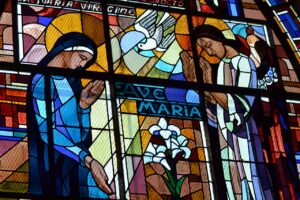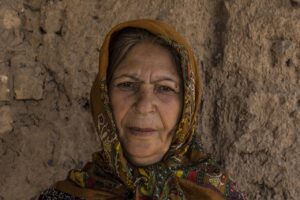Isaiah 40: 1-5, 9-11 (RM) or 1-11 (RCL); Psalm 85; 2 Peter 3: 8-14 (RM) or 8-15a (RCL); Mark 1: 1-8.
Really, sometimes you hear the most striking things from people you don’t expect.
Often when I see a street person begging, I remember my friend Mary. She was a sensitive soul, a poet, who had been badly treated by life. One time she and I were walking together up an incline that led to the cathedral in the city we were visiting, when a street person approached us to ask for money. Mary faced him, looked him compassionately in the eye, and gently said, “You know where to go for help, don’t you? Do you know where to go to get what you need?” The person nodded and said Yes. Then Mary told him that she had once lived on the street herself. She spoke with him for a few moments, said goodbye, and we continued into the cathedral.
For me it was a thought-provoking lesson in how to combine compassion and respect for human dignity.
The image of John the Baptist that comes from the Gospel of Mark makes him out to be a total oddball with whom no respectable person would want to interact. There was a reason why the author of Mark made a note of what John the Baptist was wearing and what he ate. Although the Gospel begins with a quote attributed to Isaiah (in fact it’s a mishmash from several Hebrew Bible sources), the figure of John the Baptist is all about the prophet who came in from the wilderness. In fact he was dressed like Elijah (see 2 Kings 1:8.) The author was telling a story, and seems to have taken some liberties, but with a purpose: to set John in the line of Israel’s prophets
When you burrow under the surface of the description of John, it seems that the garment he was wearing could have been made of camel’s hair, or it could just be saying that he was a hairy man. His food was what you could forage in the desert. Locusts would have provided a decent source of protein.
And then there’s the act of preaching repentance and urging the crowd to reform their lives. An earlier generation of prophets preached to the Hebrew people as a whole, to repent from the evil behaviour that they thought had caused God to punish them with defeat and exile. Now the focus was on individual persons, each in her or his own peculiar circumstances and possibilities. You cannot hide very well when the oddball prophet is addressing you directly.
And darn it all, the folks loved it. In this story no one in the crowd seems to have turned away disgusted and muttering about this wild yahoo who dared to push them to confront their own shadow side. Somehow, John and his fellow baptizers must have made their compelling message look less like shaming and condemnation, and more like – liberation, perhaps? More like a call to reform while respecting their human dignity? In their own way the baptizer-prophets were answering the call in Isaiah 40 today, “Comfort, comfort my people.”
Out of a desolate, barren nowhere-land, God’s salvation came to a broken people. Where sin and crime and selfishness had damaged human relations and entire societies, John and his fellow prophets offered a concrete way to turn it around. First, acknowledge what one has done wrong and where the damage needs to be repaired. Then, enter into the water of the Jordan to emerge as a new creation. Wash off the old stains, and make a fresh clean start. And people came from miles around, not afraid to let go of their misdeeds and failures, to begin again.
Isn’t this what hope looks like? That, from utter desolation and ruin, God can make a new creation. A macro-creation on the scale of the cosmos. Or a micro-creation, deep in our own being.
© Susan K. Roll
Susan Roll retired from the Faculty of Theology at Saint Paul University, Ottawa, in 2018, where she served as Director of the Sophia Research Centre. Her research and publications are centred in the fields of liturgy, sacraments, and feminist theology. She holds a Ph.D. from the Catholic University of Leuven (Louvain), Belgium, and has been involved with international academic societies in liturgy and theology, as well as university chaplaincy, Indigenous ministry and church reform projects.





Thank you Susan. As you say, “sometimes you hear the most striking things from people you don’t expect” or in places you didn’t expect. That I don’t expect.
And that’s often when I hear/experience those comforting words of Isaiah coming as balm: “Comfort, comfort my people.”